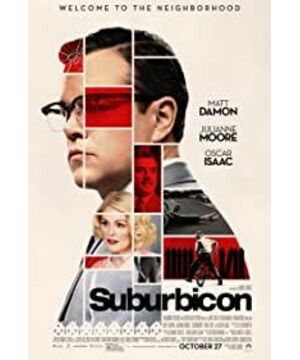In terms of acting skills, Oscar Isaac's performance is the highlight. He portrays a hateful, slick and pitiful insurance claims adjuster who is smart enough to take advantage of others' danger and finally lose his life. Duomeng and Moore play normally. The former's temperament is like a sweet and lovely poison, and the latter is a man who is derailed, greedy for money, ruthless and cowardly.
The whole film continues to maintain a two-line narrative, and the new neighbor, the black family, seems to be irrelevant, and it is not until the last moment that we realize that this is actually a reference to human nature. It is also the dehumanization of humanity. The outdoor group violence is suitable for the indoor intrigue. The audience solves the real reason for the gangsters entering the house layer by layer from the perspective of the little boy. The low-slung camera position and the cramped perspective, like spying, constantly output the clues of this peaceful and prosperous situation, which is quite suspenseful. There are two shots that make a deep impression: First, the heroine was killed. The photography only shows the shadow of the criminal and her struggle under the moonlight, surrounded by quiet insects and the sound of riots floating in the distance. The second is that the little boy was hiding from the gangster under the bed, but was fortunately rescued by his uncle. During the whole process, the audience only saw one or two pairs of feet walking around and stomping, and the angle of view was as low as that of a boy. When the gangster stretched out his hand to grab him, it really made me nervous, while the bed shook up and down during the fight, the dust fell, and it broke. Pieces of glass crashed into the picture piece by piece, and the boy who hugged and cried was so helpless in the face of adult violence.
In the details, the film is very attentive. The rag soaked in chloroform twice, the fire truck that was almost loaded with the male protagonist, the supper originally intended for the boy, the cup of coffee that the insurer never forgot, the bag of soda ash that the female protagonist used to wash the pool, the quilt. The phone line that the hostess unplugged... echoed back and forth. The development of each story is just right, the proportions are right, and the different perspectives are smoothly connected.
"Murder in Lost Town" is similar to a milder, less intense version of "Slay the Wolf." The male protagonist and his sister-in-law cheated. In order to defraud a huge amount of insurance, the two did not hesitate to buy a murdered wife or sister. When the truth was revealed, they did not hesitate to kill the insurer, and even threatened their own son and tried to poison their nephew; the insurer saw through the scam, but turned to threaten , tried to take the compensation money alone, and was finally hoarse by the female host and was hacked to death by the male host; the two murderers who were hired to kill did not hesitate to enter the house again to get the money, trying to kill women and children as a "reminder", the last one died. One was killed in a car accident.
In general, all wicked people, whether they are strangers or close relatives, cannot escape the word "greed". The adult world's self-imposed decision of "balancing the two, for the sake of the overall situation" is not as real and upright as a child's. On the other hand, Uncle Mickey and the boy's mother, two victims, two people who were betrayed by their loved ones without turning back, were not as glamorous as villains, one was considered crazy, the other was disabled in a car accident and lived in a wheelchair. The adult world must rely on deceit and frame-up to survive. Can it be eaten only by being ruthless and ruthless? Can their punishment only come by being swallowed up by desire or being clever but being mistaken by cleverness? In the hearts of adults, in the seemingly "pure, prosperous" pure-white community, do principles, beliefs, and kinship be abandoned?
For the newly moved black family, the white people who claim to be noble and progressive, and the white people who have their own perspective of God, "I don't oppose black and white living together, as long as black people read more, improve themselves more, and don't eat and be lazy", but all of them are full of crazy talk, from The family of three "saw" their "ambition" of "mixing black and white and appropriating white territory", and committed barbaric atrocities: first onlookers, and then deliberately building walls to prevent black people from getting their eyes dirty; after that, the whole town residents Playing drums and gongs in shifts day and night, trying to drive the three people away; the store arbitrarily raised prices and refused to sell to black people. In the end, stones, garbage, and Molotov cocktails were thrown, smashing, looting, and burning. Even if the people in the town are not involved, they are naked accomplices! I really don't know where the confidence of these "higher people" of civilization comes from. Their minds are full of baseless accusations and delusions, and they are still arrogant and self-confident all day long? What's more, to blame black misfortune for all the weird things that happen in small town? Little do you know that all these crimes are directed and performed by you white people, and the victims are not only white people, but also black people!
"Murder in Lost Town" tells us that no one is born with racism, and the fence is built by white people. It is difficult to cross this road. Difficult, easy to say.
Sin originates from human nature, regardless of skin color. There are hundreds of white families in the lost town, and it is impossible to guarantee that a few are pregnant with violence and darkness. Children and black families, whom white adults think they can manipulate at will, are in fact the most innocent and tough part of human nature. Just like the warm afternoon at the end of the film, the unfortunate thing is that they can only appear after the sin, and the good thing is that they always survive every time they are ravaged.
View more about Suburbicon reviews











